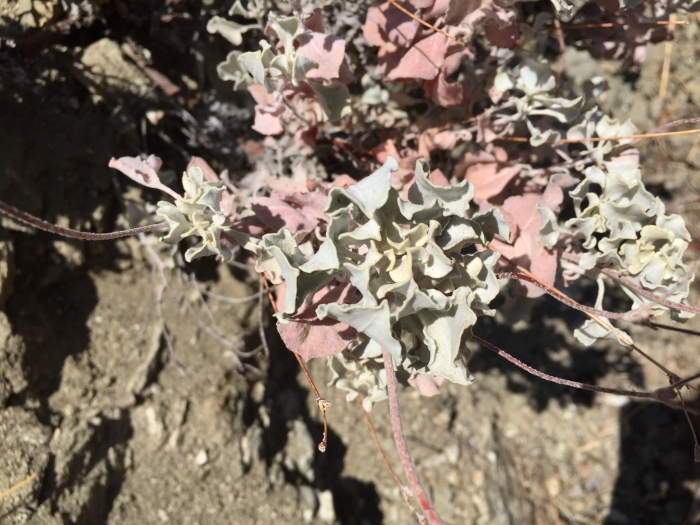Hoary Buckwheat
(Eriogonum saxatile)
Hoary Buckwheat (Eriogonum saxatile)
/
/

Lynn Sweet
CC BY 4.0
Image By:
Lynn Sweet
Recorded By:
Copyright:
CC BY 4.0
Copyright Notice:
Photo by: Lynn Sweet | License Type: CC BY 4.0 | License URL: http://creativecommons.org/licenses/by/4.0/ | Rights Holder: Lynn Sweet | Publisher: iNaturalist | Date Created: 2016-07-28T18:25:18Z |



















































Estimated Native Range
Summary
Eriogonum saxatile, commonly known as Hoary Buckwheat, is an evergreen perennial subshrub or herb native to rocky outcrops and slopes within chaparral and scrub habitats of California and Nevada. It is a variable plant that can be a spindly 10 centimeters tall or a bushy 40 centimeters. The leaves form a dense mat on the ground, each leaf reaching up to 2 or 3 centimeters wide, and are characteristically rounded or scoop-shaped and densely woolly. The stout, woolly inflorescence branches produce clusters of flowers at nodes, which are typically red or pale yellow and bloom from late spring to early fall, adding seasonal interest to the garden.
Hoary Buckwheat is valued for its drought tolerance and ability to thrive in poor, rocky soils, making it an excellent choice for rock gardens and xeriscaping. Its low water requirements and ability to form a ground cover are beneficial for erosion control on slopes. In cultivation, it prefers full sun and well-drained soils, tolerating a range of soil types from sandy to loamy. While it is generally low-maintenance, it can be susceptible to root rot if overwatered. Hoary Buckwheat is also appreciated by pollinators, attracting bees and butterflies with its flowers.CC BY-SA 4.0
Hoary Buckwheat is valued for its drought tolerance and ability to thrive in poor, rocky soils, making it an excellent choice for rock gardens and xeriscaping. Its low water requirements and ability to form a ground cover are beneficial for erosion control on slopes. In cultivation, it prefers full sun and well-drained soils, tolerating a range of soil types from sandy to loamy. While it is generally low-maintenance, it can be susceptible to root rot if overwatered. Hoary Buckwheat is also appreciated by pollinators, attracting bees and butterflies with its flowers.CC BY-SA 4.0
Plant Description
- Plant Type: Subshrub, Herb
- Height: 0.3-0.6 feet
- Width: 0.3-0.6 feet
- Growth Rate: Moderate
- Flower Color: Yellow, Red, White
- Flowering Season: Summer
- Leaf Retention: Evergreen
Growth Requirements
- Sun: Full Sun
- Water: Low, Medium
- Drainage: Medium, Fast
Common Uses
Bee Garden, Bird Garden, Butterfly Garden, Drought Tolerant, Erosion Control, Low Maintenance
Natural Habitat
Rocky outcrops and slopes within chaparral and scrub habitats
Other Names
Common Names: Rock Buckwheat
Scientific Names: , Eriogonum saxatile, Eriogonum bloomeri, Eriogonum stokesae, Eriogonum saxatile subsp. multicaule, Eriogonum saxatile var. bloomeri, Eriogonum saxatile var. stokesiae,
GBIF Accepted Name: Eriogonum saxatile S.Watson